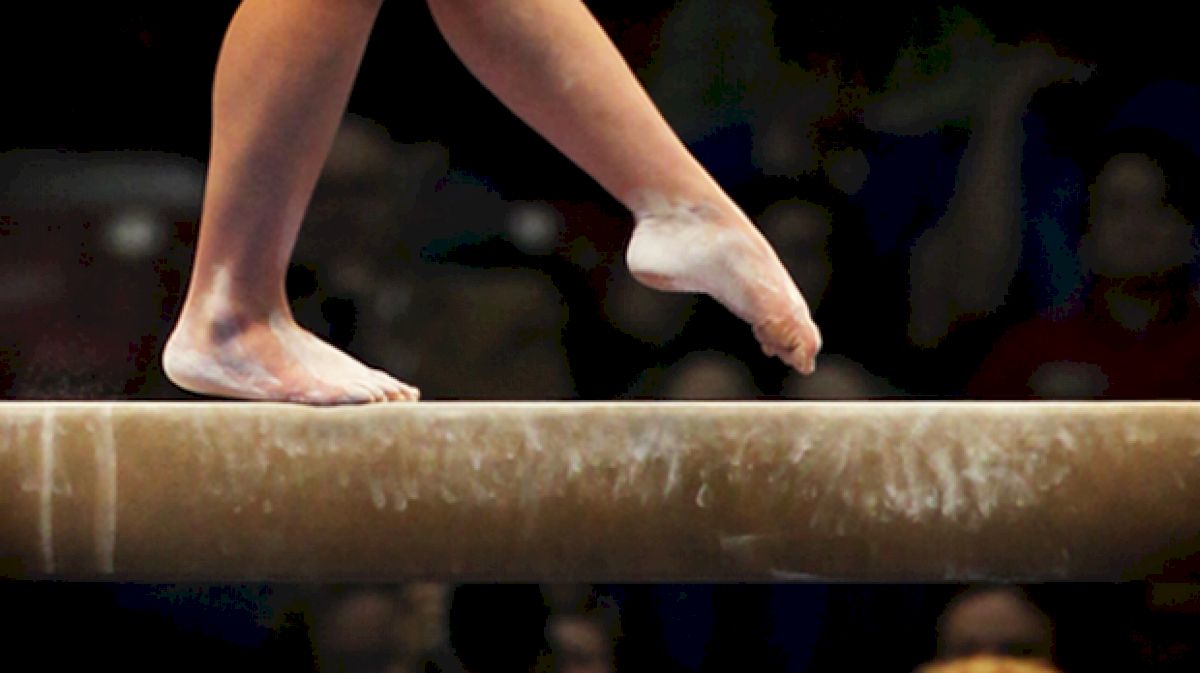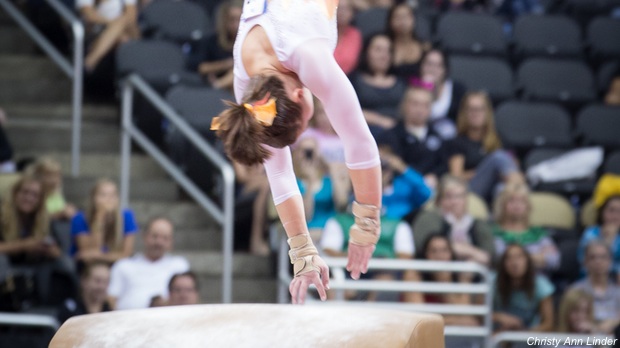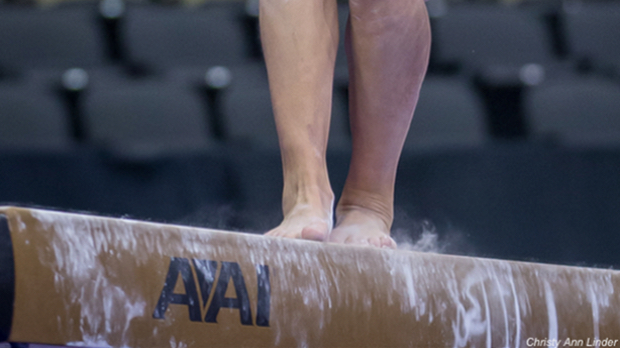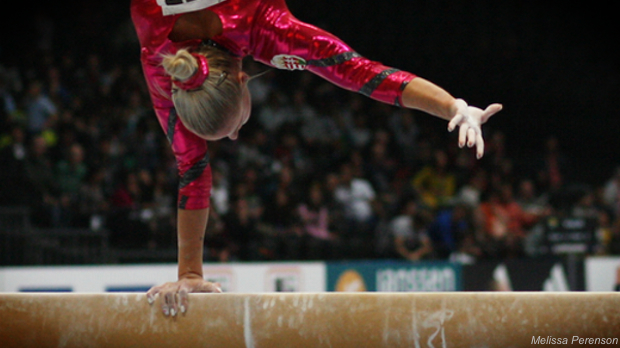The Gymnastics Kitchen with Betsy: Breaking the Diet Mentality
The Gymnastics Kitchen with Betsy: Breaking the Diet Mentality
Gymnastics is a weight-controlled competitive sport, which generally means the lighter you are, the easier your sport tends to be. But this assumption often

Gymnastics is a weight-controlled competitive sport, which generally means the lighter you are, the easier your sport tends to be. But this assumption often leads to detrimental choices by gymnasts who feel they must always be on a diet to achieve lightness. As a trainer, I can tell you one of the top questions I get is, “How can I lose weight?”
After 15 years in this industry, I can confidently say the typical American gymnast is missing balance in their diet. I have seen and worked with this issue in either direction—over-eating or under-eating, binging or restricting.
So, how do you overcome it? Read on to see the top five things gymnasts, coaches, parents and trainers need to know about maintaining a balanced, performance-driven diet.

1) Gymnastics is a moderate calorie-burning sport.
Since the sport is both anaerobic and aerobic, gymnasts burn both fat and carbohydrate calories while training and competing. In general, gymnasts need quick bursts of energy, which come from muscle glycogen (carbohydrates stored in the muscle). Gymnasts do not run marathons or sustain consistent fat-burning cardiovascular exercise for four to five hours like a triathlete or distance runner. That's why it's important for gymnasts to fuel their bodies with a balanced mix of complex carbohydrates, fats and protein, along with lots of water.
Restricting or overeating any of these macronutrients could be disastrous for any athlete. In other words, just because you worked out for five hours doesn't mean you burned a ton of calories. As a gymnast, you wait at the chalk box, wait in line for vault, and rest between tumbling passes and turns on bars. Working out for long hours in gymnastics does not give you a free pass to eat whatever you want.
I've seen many gymnasts gain tremendous amounts of weight as a result of this thought process. At the same time, the sport requires an adequate amount of calories and certain foods to power through long anaerobic workouts. Gymnasts also require significant repair of muscle fibers through adequate protein intake. The truth is, finding balance through nutrition is both complicated and crucial to a gymnast!
2) When you are AT REST, your body burns a certain amount of calories.
Your body already burns a lot of calories—even while you're sleeping and inactive. This is called your basal metabolic rate, or BMR. To figure out your BMR caloric intake number, simply add a 0 to your weight. So if you weigh 120 pounds, your basal metabolic rate is 1,200 calories. That means if you were to do nothing all day, you could eat 1,200 calories and not gain a pound. Therefore, you must factor in all of your daily activities, your workouts and your BMR to find out your daily caloric needs.
Perhaps you burn an additional 500 calories walking around, going to the mall, cleaning your bedroom, doing homework, then add in your calories for a workout, which may be an additional 300-600 calories. As a result, your total caloric intake to maintain your weight may be around 2,000 to 2,500 calories daily. The trick is you need to find a balance where you aren’t eating too much or too little.
This is where many go wrong. High-calorie foods are easily accessible in the forms of fast food and pre-packaged meals and snacks. I've seen a gymnast eat Pop Tarts for breakfast, take down a large pizza in one sitting (about 2,000 calories) and finish the night with ice cream because they thought they would burn it off. Not the case... not to mention these foods are laden with fat and sugar.

3) Dieting is not the answer.
I've seen this time and time again: a starvation mentality. Restricting calories slows down your metabolic rate (your body's ability to burn calories) and puts your body into starvation mode. You see, our bodies are smart. If you starve yourself long enough, your body will hold onto any fat or calories you give it to prepare for a famine.
That's why many of my clients who eat only one meal a day are overweight—they put themselves into starvation mode, so their body stores all of their calories as fat. If you fall into this category, you can break the cycle by either shocking your system with different weight-bearing exercises, or by eating small, high-protein and metabolic-enhancing meals frequently to rev up your metabolism. Starving also leads to malnutrition, improper rebuilding of muscle tissue, bone density weakness, hair loss, and loss of menstruation, among many other issues. Starvation is not the answer, and it won't improve your gymnastics career.
4.) Working out 4-5 hours a day doesn't give you an all-access pass at the buffet!
Sure, there are lucky ones who have very fast metabolic rates and can get away with eating “whatever they want”... for now.
In time, this will eventually catch up with them. Calories are calories, and 3,500 excess calories equals one pound of fat. If you eat an extra 500 calories each day for a week, that's a pound gained each week. BALANCE is key. Plus, pizza and Pop Tarts will not yield the maximum energy sources for performance!

5) Listen to your body, and eat the correct macronutrients and calories for your specific weight and goals.
Gymnasts need complex carbohydrates in the form of fruits, grains and vegetables, as well as protein, healthy fat and dairy. Gymnasts also need a lot of water before, during and after practice to achieve maximum performance. Get out of the dieting and all-or-nothing mentality by eating the correct amount of calories and macronutrients for your weight and gymnastics goals. Overeating and starvation will get you nowhere. Have your occasional treats and do not restrict food groups, but keep your meals clean, balanced and nutritious.
If you would like an individualized meal plan, contact Betsy McNally-Laouar at coach@betsymcnally.com.
Betsy is a personal fitness and gymnastics trainer certified in sports nutrition. She currently works with the elite and upper level gymnasts at Cincinnati Gymnastics by creating training and meal plans. She also works with gymnasts all around the country through online seminars and camps. If you need help with gymnastics recipes, meal plans or fitness, check out her website, www.betsymcnally.com, and email her at coach@betsymcnally.com.
After 15 years in this industry, I can confidently say the typical American gymnast is missing balance in their diet. I have seen and worked with this issue in either direction—over-eating or under-eating, binging or restricting.
So, how do you overcome it? Read on to see the top five things gymnasts, coaches, parents and trainers need to know about maintaining a balanced, performance-driven diet.

1) Gymnastics is a moderate calorie-burning sport.
Since the sport is both anaerobic and aerobic, gymnasts burn both fat and carbohydrate calories while training and competing. In general, gymnasts need quick bursts of energy, which come from muscle glycogen (carbohydrates stored in the muscle). Gymnasts do not run marathons or sustain consistent fat-burning cardiovascular exercise for four to five hours like a triathlete or distance runner. That's why it's important for gymnasts to fuel their bodies with a balanced mix of complex carbohydrates, fats and protein, along with lots of water.
Restricting or overeating any of these macronutrients could be disastrous for any athlete. In other words, just because you worked out for five hours doesn't mean you burned a ton of calories. As a gymnast, you wait at the chalk box, wait in line for vault, and rest between tumbling passes and turns on bars. Working out for long hours in gymnastics does not give you a free pass to eat whatever you want.
I've seen many gymnasts gain tremendous amounts of weight as a result of this thought process. At the same time, the sport requires an adequate amount of calories and certain foods to power through long anaerobic workouts. Gymnasts also require significant repair of muscle fibers through adequate protein intake. The truth is, finding balance through nutrition is both complicated and crucial to a gymnast!
2) When you are AT REST, your body burns a certain amount of calories.
Your body already burns a lot of calories—even while you're sleeping and inactive. This is called your basal metabolic rate, or BMR. To figure out your BMR caloric intake number, simply add a 0 to your weight. So if you weigh 120 pounds, your basal metabolic rate is 1,200 calories. That means if you were to do nothing all day, you could eat 1,200 calories and not gain a pound. Therefore, you must factor in all of your daily activities, your workouts and your BMR to find out your daily caloric needs.
Perhaps you burn an additional 500 calories walking around, going to the mall, cleaning your bedroom, doing homework, then add in your calories for a workout, which may be an additional 300-600 calories. As a result, your total caloric intake to maintain your weight may be around 2,000 to 2,500 calories daily. The trick is you need to find a balance where you aren’t eating too much or too little.
This is where many go wrong. High-calorie foods are easily accessible in the forms of fast food and pre-packaged meals and snacks. I've seen a gymnast eat Pop Tarts for breakfast, take down a large pizza in one sitting (about 2,000 calories) and finish the night with ice cream because they thought they would burn it off. Not the case... not to mention these foods are laden with fat and sugar.

3) Dieting is not the answer.
I've seen this time and time again: a starvation mentality. Restricting calories slows down your metabolic rate (your body's ability to burn calories) and puts your body into starvation mode. You see, our bodies are smart. If you starve yourself long enough, your body will hold onto any fat or calories you give it to prepare for a famine.
That's why many of my clients who eat only one meal a day are overweight—they put themselves into starvation mode, so their body stores all of their calories as fat. If you fall into this category, you can break the cycle by either shocking your system with different weight-bearing exercises, or by eating small, high-protein and metabolic-enhancing meals frequently to rev up your metabolism. Starving also leads to malnutrition, improper rebuilding of muscle tissue, bone density weakness, hair loss, and loss of menstruation, among many other issues. Starvation is not the answer, and it won't improve your gymnastics career.
4.) Working out 4-5 hours a day doesn't give you an all-access pass at the buffet!
Sure, there are lucky ones who have very fast metabolic rates and can get away with eating “whatever they want”... for now.
In time, this will eventually catch up with them. Calories are calories, and 3,500 excess calories equals one pound of fat. If you eat an extra 500 calories each day for a week, that's a pound gained each week. BALANCE is key. Plus, pizza and Pop Tarts will not yield the maximum energy sources for performance!

5) Listen to your body, and eat the correct macronutrients and calories for your specific weight and goals.
Gymnasts need complex carbohydrates in the form of fruits, grains and vegetables, as well as protein, healthy fat and dairy. Gymnasts also need a lot of water before, during and after practice to achieve maximum performance. Get out of the dieting and all-or-nothing mentality by eating the correct amount of calories and macronutrients for your weight and gymnastics goals. Overeating and starvation will get you nowhere. Have your occasional treats and do not restrict food groups, but keep your meals clean, balanced and nutritious.
If you would like an individualized meal plan, contact Betsy McNally-Laouar at coach@betsymcnally.com.
Betsy is a personal fitness and gymnastics trainer certified in sports nutrition. She currently works with the elite and upper level gymnasts at Cincinnati Gymnastics by creating training and meal plans. She also works with gymnasts all around the country through online seminars and camps. If you need help with gymnastics recipes, meal plans or fitness, check out her website, www.betsymcnally.com, and email her at coach@betsymcnally.com.